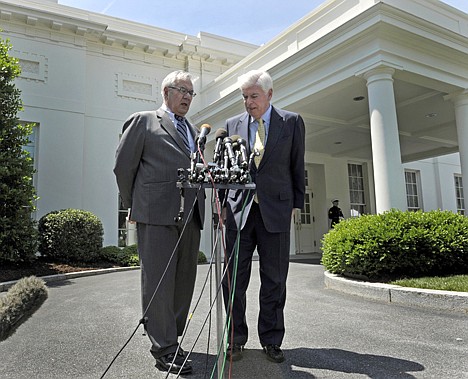US overhaul could push some trading overseas
MADRID - Will the U.S. financial overhaul push big firms to transfer business to Europe? Some say no: Europe is also working on efforts to tighten up on risk-taking, though Asia and non-EU member Switzerland still remain more loosely regulated.
Now that the bill aimed at cracking down on the abuses that caused the 2008 financial crisis has been agreed on by U.S. House and Senate negotiators, analysts are scrambling to calculate whether the new changes for regulatory regimes will disfavor lucrative activities and create an incentive to move trading desks.
At first glance, one potential competitor - the 16-country eurozone - could be seen as a less likely destination for anyone wanting to shift operations, because governments are already pledging to crack down on risk-taking bankers in the hopes of warding off more expensive bailouts. A European plan for new regulation could be in place in a month, with approval perhaps a year away.
The new government in Britain, with its City of London financial district, is also moving to levy a new tax on the assets of the biggest banks, and the outgoing government imposed a one-off, 50 percent tax on outsized, unpopular bank bonuses.
So a more likely departure destination could be Asia, the thinking goes - although many officials, banks and analysts said they hadn't had a chance to read and parse the bill. Lawmakers hope the House and Senate will approve the compromise legislation by July 4.
"The possibility is pretty good they will move some of their operations outside of the United States, but it's obvious they probably won't move to London or Frankfurt. Singapore, Shanghai, Hong Kong, Tokyo and Zurich are the best bets," Richard Bove senior vice president of equity research at Rochdale Securities in Stamford, Connecticut.
"It's gonna cost them money, but they will find ways to move around the rules."
Asia comes in strong as a destination for transferring financial trading operations because of a looser regulatory environment and business friendly reputation, some analysts said. Also, many international finance companies already systems have Asian divisions already set up that can be expanded, and the technology is generally first-rate.
Meanwhile, Switzerland has a long banking history while it isn't a part of the European Union and isn't expected to join.
"If I was running one of the big banks, I would be saying: "How does this affect my trading business, and where can I move that business so I can continue to operate?'" said Stephen Matlin, managing director of the Matlin Associates investment banking firm in Madrid.
"A lot of lawyers will be racking up a lot of hours on how to do this. They have been while the bill was being formed, and now they are on overdrive."
Big European banks with U.S. operations like Deutsche Bank, Germany's biggest lender, said it's still too early to comment on the U.S. bill. "We're currently evaluating it," said spokesman Roland Weichert. Several European finance ministries took the same no comment stance, but a spokesman for British Prime Minister David Cameron said he welcomed news of agreement on the U.S. bill.
"Like the U.S., the U.K. is taking serious steps to reform the content and system of our domestic regulation to ensure the future resilience of the financial sector," said the spokesman, who spoke on condition of anonymity as the matter had not yet been formally discussed.
Obama presented the reforms to world leaders meeting in Huntsville, Ontario, said a European official present at the talks who requested anonymity. For Europeans, the U.S. is going in the right direction, he said, while adding that the details have not yet been studied.
Investors had been concerned that the financial regulation bill would curtail bank profits by limiting financial companies' ability to trade in derivatives - complex securities that derive their value from other assets such as stocks, bonds or foreign currencies and which investors often use to hedge against losses.
Some derivatives are purely speculative investments, and some types of derivatives have been blamed for contributing heavily to the large losses suffered by banks and other companies during the 2008 financial crisis.
The bill provides for derivatives trading to be regulated, but the harshest provisions related to the investments were not included.
However, European regulators are expected to propose even harsher regulations for derivatives trading, and may see the watered down U.S. bill as not having gone far enough, analysts said.
European banks are unlikely to make any strategic decisions now because they don't have enough information about the details that the European regulation might involve, said Stephen Lewis of London's Monument Securities.
"We don't know the final form of the EU legislation yet," he said.
European banks probably have an advantage over their U.S. counterparts because "they can redirect business currently booked in the USA to other financial centers," Lewis added.
And some analysts predict an eventual European overhaul might come in piecemeal form, nation by nation.
The U.S. overhaul "seems to be taking the lead. In Europe, there are not so many restrictions on what banks can do," said Paul Ashworth, senior U.S. economist at Capital Economics in London. "Europe is not pushing for it quite as much. And if it does get done, it's going to be done country by country."
But banking institutions have come to the conclusion that "it is only prudent management to shift some of what you are doing outside the United states," Bove said.
"Obviously not the whole trading operations, but why do you have to trade oil or currency in New York? Maybe you have to trade some commodities in Chicago, but there's a lot of things you don't have to trade there," he said.
Contributing to this report: Associated Press writers Jane Wardell and Emma Vandore in Huntsville, Ontario; David Rising in Berlin; Carlos Piovano in London contributed to this report.

